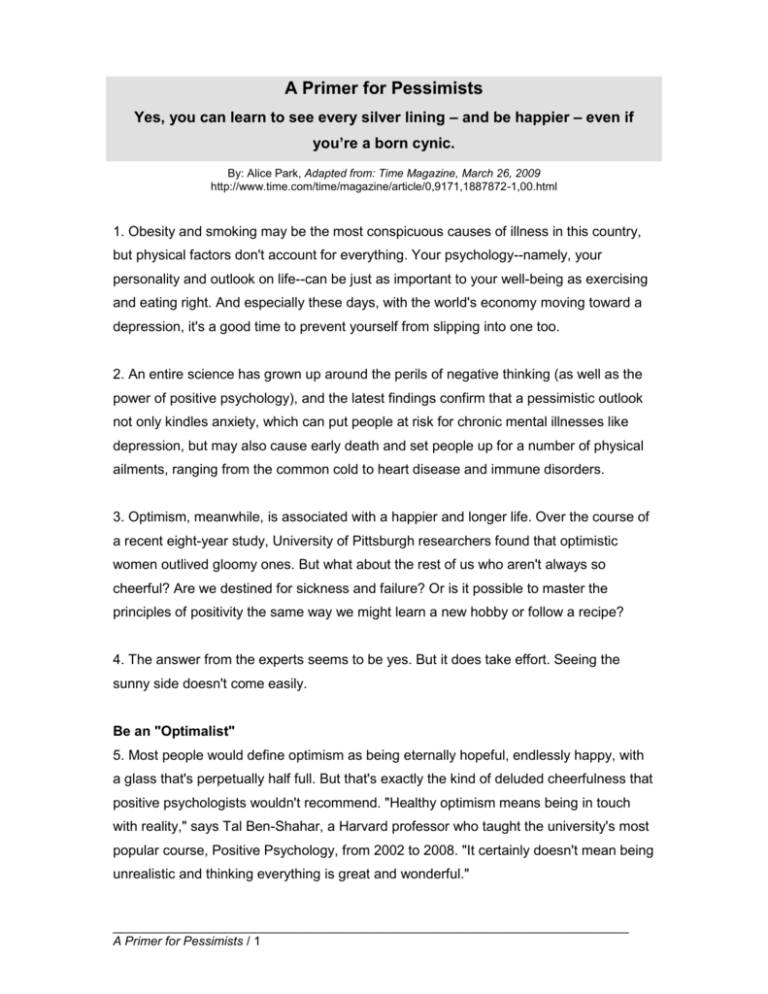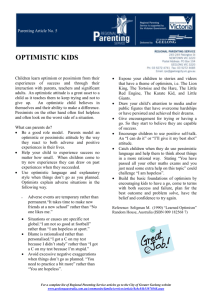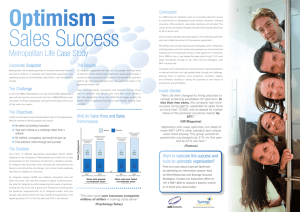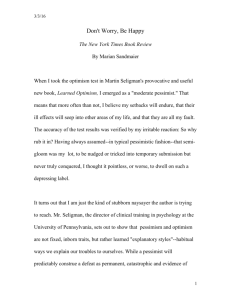1. “Nobody can go back and start a new beginning, but anyone can
advertisement

A Primer for Pessimists Yes, you can learn to see every silver lining – and be happier – even if you’re a born cynic. By: Alice Park, Adapted from: Time Magazine, March 26, 2009 http://www.time.com/time/magazine/article/0,9171,1887872-1,00.html 1. Obesity and smoking may be the most conspicuous causes of illness in this country, but physical factors don't account for everything. Your psychology--namely, your personality and outlook on life--can be just as important to your well-being as exercising and eating right. And especially these days, with the world's economy moving toward a depression, it's a good time to prevent yourself from slipping into one too. 2. An entire science has grown up around the perils of negative thinking (as well as the power of positive psychology), and the latest findings confirm that a pessimistic outlook not only kindles anxiety, which can put people at risk for chronic mental illnesses like depression, but may also cause early death and set people up for a number of physical ailments, ranging from the common cold to heart disease and immune disorders. 3. Optimism, meanwhile, is associated with a happier and longer life. Over the course of a recent eight-year study, University of Pittsburgh researchers found that optimistic women outlived gloomy ones. But what about the rest of us who aren't always so cheerful? Are we destined for sickness and failure? Or is it possible to master the principles of positivity the same way we might learn a new hobby or follow a recipe? 4. The answer from the experts seems to be yes. But it does take effort. Seeing the sunny side doesn't come easily. Be an "Optimalist" 5. Most people would define optimism as being eternally hopeful, endlessly happy, with a glass that's perpetually half full. But that's exactly the kind of deluded cheerfulness that positive psychologists wouldn't recommend. "Healthy optimism means being in touch with reality," says Tal Ben-Shahar, a Harvard professor who taught the university's most popular course, Positive Psychology, from 2002 to 2008. "It certainly doesn't mean being unrealistic and thinking everything is great and wonderful." __________________________________________________________________________ A Primer for Pessimists / 1 6. Ben-Shahar, who is the author of Happier (2007) and a new book, The Pursuit of Perfect (April 2009), describes realistic optimists as "optimalists"--not those who believe everything happens for the best, but those who make the best of things that happen. 7. In his own life, Ben-Shahar uses three optimalist exercises, which he calls PRP. When he feels down--say, after giving a bad lecture--he grants himself permission (P) to be human. He reminds himself that not every lecture can be a Nobel winner; some will be less effective than others. Next is reconstruction (R). He analyzes the weak lecture, learning lessons for the future about what works and what doesn't. Finally, there's perspective (P), which involves acknowledging that in the grand scheme of life, one lecture really doesn't matter. 8. Studies suggest that people who are able to focus on the positive consequence from a negative event--basically, cope with failure--can protect themselves from the physical toll of stress and anxiety. In a recent study at the University of California, San Francisco (UCSF), scientists asked a group of women to give a speech in front of a stone-faced audience of strangers. On the first day, all the participants said they felt threatened, and they showed spikes in cortisol and fear hormones. On subsequent days, however, those women who had reported rebounding from a major life crisis in the past no longer felt the same subjective threat over speaking in public--and did not show a jump in cortisol. They had learned that this negative event, too, would pass and they would survive. "It's a back door to the same positive state because people are able to tolerate and accept the negative," says Elissa Epel, one of the psychologists involved in the study. Accept Pain and Sadness 9. Being optimistic doesn't mean shutting out sad or painful emotions. As a clinical psychologist, Martin Seligman, who runs the Positive Psychology Center at the University of Pennsylvania, says he used to feel proud whenever he helped depressed patients rid themselves of sadness, anxiety or anger. "I thought I would get a happy person," he says. "But I never did. What I got was an empty person." That's what prompted him to launch the field of positive psychology, with a groundbreaking address to the American Psychological Association in 1998. Instead of focusing only on righting wrongs and lifting misery, he argued, psychologists need to help patients foster good mental health through constructive skills, like Ben-Shahar's PRP. The idea is to teach patients to strengthen their strengths rather than simply improve their weaknesses. "It's __________________________________________________________________________ A Primer for Pessimists / 2 not enough to clear away the weeds and underbrush," Seligman says. "If you want roses, you have to plant a rose." 10. When a loved one dies or you lose your job, for example, it's normal and healthy to mourn. You're supposed to feel sad and even depressed. But you can't cocoon yourself in sadness for too long. A study by UCSF researchers of HIV-positive men whose partners had died found that the men who allowed themselves to grieve while also seeking to accept the death were better able to bounce back from the tragedy. Men who focused only on the loss as opposed to, say, viewing the death as a relief of their partner's suffering, tended to grieve longer, presumably because they couldn't find a way out of their sadness. Smile in Your Profile Picture 11. If all else fails, try "catching" happiness from your friends. We are social beings, of course, and our outlook is influenced to no small degree by that of our friends and family. Dr. Nicholas Christakis, a professor at Harvard Medical School, documented in a 2008 study just how extensive and powerful this network effect is. Compared with gloomy people, those who were happy were more likely to be surrounded by other happy people--even the friends of happy people's friends' friends (who might be complete strangers) tended to be happy. 12. Christakis and his colleague James Fowler at the University of California, San Diego, are now studying happiness contagion in perhaps the largest social network of all, Facebook. They noticed that people who smiled in their Facebook profile pictures tended to have other friends who smiled. This might simply be peer pressure at work, with members feeling obliged to flash a smile to fit in with the rest of the group, but Christakis and Fowler are investigating whether there might be an infectious phenomenon at work. ******** 13. If you still aren't convinced that your pessimistic ways can ever be changed, consider this: only about 25% of a person's optimism may be hardwired in his genes, according to some studies. That's in contrast to the 40% to 60% heritability of most other personality traits, like agreeableness and conscientiousness. Science suggests that the greater part of an optimistic outlook can be acquired with the right instruction--a theory supported by a study of college freshmen by Seligman. Pessimistic students who took a 12-week __________________________________________________________________________ A Primer for Pessimists / 3 optimism-training course devised by Seligman--which included exercises like writing a letter of gratitude then reading it aloud to someone--were less likely to visit the student health center for illnesses during the next four years than their similarly pessimistic peers who weren't tutored in positive thinking. And a larger study of more than 3,000 middleschool students who are being taught resilience techniques is under way in England. "It's the largest-scale validation that optimism can be taught," says Seligman, who developed the techniques used in the study. 14. The thing about being optimistic, though, is that it takes hard work. It's an active process, say psychologists, through which you force yourself to see your life a certain way. Indeed, the leading optimism and happiness experts consider themselves born pessimists. But if they have learned over time and with lots of practice to become more hopeful, don’t worry. So can you. __________________________________________________________________________ A Primer for Pessimists / 4 Exercises adapted from Dr. Anna Lyubman Primer for Pessimists – Exercises I. Pre-reading 1. “Every cloud has a silver lining.” a. What do you think this expression means? ___________________________________________________________________ b. Are there any comparable expressions in your native language? ___________________________________________________________________ c. Give an example of this from your life. ___________________________________________________________________ 2. Continue the following two sentences: An optimist is…_______________________________________________________ A pessimist is…______________________________________________________ 3. If your friend were upset about something, how would you try to improve her/ his mood? ___________________________________________________________________ 4. List the things that can improve your mood and make you feel happier. ___________________________________________________________________ ___________________________________________________________________ __________________________________________________________________________ A Primer for Pessimists / 5 II. Global Questions 1. Which paragraph(s) make(s) up the introduction of the article? _________________ 2. Based on the subtitles, what information do you expect to find in the other sections of the article?__________________________________________________________ 3. Which paragraph(s) is/are the conclusion? ________________ III. Close Reading Questions 1. According to paragraph 1, "physical factors don't account for everything." a. What cannot be explained by physical factors alone? (Complete the sentence.) Why people _________________________________________________________ b. What else affects a person's well being? __________________________ 2. According to recent findings, what are the consequences of a negative attitude to life? a. ______________________, (ONE WORD) which can lead to __________________________________________________ b. ________________________________________________________________ c. ________________________________________________________________ 3. What general point is supported by the study at Pittsburgh University? ___________________________________________________________________ 4. Paragraph 4: "The answer from the experts seems to be yes". What do most experts agree about? Choose the correct answer: a. Pessimists are unlikely to change their negative nature. b. Following a new hobby can improve one's mental and physical health. c. A negative outlook can result in psychological and physical problems. d. A positive attitude to life may be acquired through effort and determination. 5. According to paragraph 5, how is Ben-Shahar’s view different from the widespread opinion on optimism and optimists? (Complete the sentence below.) In contrast to public opinion, Ben-Shahar emphasizes the importance of _________________________________________________________________. 6. What is an "optimalist"? (Answer in a few words.) __________________________________________________________________ __________________________________________________________________________ A Primer for Pessimists / 6 7. a. In the PRP exercises, what does each letter stand for? Step 1 P: ____________________________ Step 2 R: ____________________________ Step 3 P: ____________________________ b. Orit felt upset because she didn't do too well on one of the vocabulary quizzes in English. In order to improve her mood, she tried to use Ben-Shahar's optimalist exercises (PRP). Next to each of the sentences below, write which optimalist exercise it represents. Then indicate the order of the exercises by circling the numbers at the end. ___________ a. Orit went over her quiz, learned the words she hadn't known before, and corrected her mistakes. 1 2 3 ___________ b. Orit told herself that from now on she would get ready for every future quiz and that one low grade could not seriously affect her final result. 1 2 3 ___________ c. Eventually, Orit calmed down and told herself that this time she wasn't prepared enough because she had other serious commitments. 1 2 3 8. According to the study at the University of California (par. 8), which people will be able to protect themselves from the negative effects of stress? a. Those who are not afraid of speaking in front of groups of strangers. b. Those whose levels of cortisol and fear hormones are consistently high. c. Those who have succeeded in recovering from previous hardships. d. People who refuse to face negative life crises when they happen. 9. How does Martin Seligman’s Positive Psychology differ from his previous approach? (Complete the sentence.) Whereas Seligman’s previous approach was to _____________________________ ___________________________________________________________________, the goal of Positive Psychology is to improve mental health by teaching patients _____________________________________________. 10. In the study of HIV-positive men, which patients recovered more quickly? (Complete the sentence.) __________________________________________________________________________ A Primer for Pessimists / 7 The men who tried to _______________________________________ in addition to mourning. 11. a. Read paragraphs 11 and 12, and then match Dan and Galit to their friends by drawing lines between them. Galit Dan C A B E D b. Quote a sentence from the text that justifies your choices. Par. ______ ________________________________________________________ ___________________________________________________________________ 12. What can explain the fact that people smiling in their Facebook profile pictures tend to have smiling friends as well? List 2 possible reasons. a. The friends of smiley people smile because ___________________________________________________________________ b. The friends of smiley people smile because ___________________________________________________________________ 13. What idea is supported by the statistics at the beginning of paragraph 13? (Complete the sentence below by circling the correct words.) Because being optimistic or pessimistic depends on heredity to A SMALL DEGREE / A GREAT DEGREE, the trait of pessimism CAN / CANNOT be changed. 14. a. What is similar about the studies of freshman college students by Seligman and that of middle-school students in England? (Complete the sentence). They both show that __________________________________________________ __________________________________________________________________________ A Primer for Pessimists / 8 b. Give an example of an instruction that can promote positive thinking. ___________________________________________________________________ 15. a. Complete the following sentence based on the writer's conclusion: Although the writer contends that it is possible to learn to be optimistic, he notes that this task requires ___________________________________. b. Who does he base his opinion on? ___________________________________________________________________ IV. Post-reading Activities 1. Optimism Quiz: Are you prone to optimism or pessimism? Test yourself! As you read each question, try to imagine yourself in each situation. Think of how you would react (be honest), and then choose the answer that sounds most like what you would say to yourself. Have fun! 1. You've been working hard at dieting and you lose 10 pounds. You think: a. "This diet really works! I hope I can lose more." b. "My hard work is paying off! I'll be at my target weight in no time." 2. You start a new work out program and are really sore the next day. You think: a. "Wow, I must be out of shape!" b. "Wow, I worked hard yesterday!" 3. You are trying to figure out a new computer program, and after hours of work it still eludes you. You think: a. "Wow, technology has become SO complicated. It'll take me a little longer to finally get this." b. "I’m just not good with computers. I am going to ask someone to do this for me." 4. You find you don't have the money to pay all your bills at the end of the month. You think: a. "It's been a slow month for business. Things will pick up next month." b. "I am not good at managing money. This is a serious problem." 5. You get hired for the job, even though the other applicants were extremely qualified. You think: a. "I must be more qualified than I gave myself credit for." b. "I must have interviewed really well!" 6. You got an" A" on the exam. You think: a. "Wow, I am smart!" b. "Wow, I was prepared!" __________________________________________________________________________ A Primer for Pessimists / 9 7. You miss a bus and have to wait for another one. You think: a. "I guess I'll catch the next bus. At least I have some time to do my English homework before class." b. "This always happens to me! The bus leaves right when I get there!" 8. You meet an important business contact at a party. You think: a. "Lucky me! I was in the right place at the right time." b. "I was smart to come to this party!" 9. Someone cuts you off in traffic. You think: a. "People are so rude!" b. "That person must be having a bad day!" 10. A stranger on the street compliments your outfit. You think: a. "What a weird person.” b. "I must look really good." Count your choices. If more than half of your answers turned out to be "pessimistic", don't worry! You can change… (See the article above!) Your score: 2. Optimism Quotes. Read the following quotes of different people about optimism. Then work in groups and write your own declaration of optimism. Be creative! 1. “Nobody can go back and start a new beginning, but anyone can start today and make a new ending.” (Maria Robinson) 2. A pessimist sees the difficulty in every opportunity; an optimist sees the opportunity in every difficulty.” (Winston Churchill) 3. “I can't change the direction of the wind, but I can adjust my sails to always reach my destination.” (Jimmy Dean) Your declaration of optimism: ______________________________________________________________________ ______________________________________________________________________ __________________________________________________________________________ A Primer for Pessimists / 10 A Primer for Pessimists – Vocabulary Find and underline the following words in the text. Word Also in par. # Paragraph 1 3. prevent (v.) Also in par. # Paragraph 9 1. factor (n.) 2. outlook (n.) Word 12. focus (v./n.) 2, 13 10 13. prompt (v.) 14. foster (v.) 15. strengthen (v.) Paragraph 2 4. anxiety (n.) Paragraph 10 5. ranging (from …) 16. relief (n.)/ relieve (v.) range (v./n.) Paragraph 3 6. master (v.) Paragraph 7 Paragraph 11 17. degree (n.) to no small degree Paragraph 12 7. permission (n.) permit (v.) 18. investigate (v.) 8. acknowledge (v.) 19. consider (v.) Paragraph 8 9. participant (n.) participate (v.) 10. subsequent (adj.) Paragraph 13 20. heritability (n.) inherit (v.) heredity (n.) 11. tolerate (v.) -en: strengthen, threaten -out outlive __________________________________________________________________________ A Primer for Pessimists / 11 Exercise 1: Applying Meanings Circle the letter of each correct answer to the questions below. There may be more than one correct answer. 1. When do you feel anxiety? a. before a test d. before going on a date b. while reading a book c. while talking with your parents 2. What can strengthen your muscles? a. daily exercise c. a heated argument b. a bowl of popcorn d. an energy drink 3. For what do you need permission? a. for entering a classroom late c. for getting married b. for participating in online courses at BIU d. for taking a pilots’ course 4. What traits would you like to foster in your children? a. creativity c. laziness b. carelessness d. patience 5. Which factors may affect your career choice? a. high salary c. your parents' attitude b. talent d. peer pressure 6. Which features are accounted for by heritability? a. tendency to violence c. eye color b. sense of humor d. intelligence 7. What can prevent you from getting a good grade on an English test? a. bad luck c. anxiety b. a headache on the test day d. lack of knowledge 8. What can change your outlook on life? a. winning a lottery c. being disappointed by a friend b. getting married d. something else – explain __________________________________________________________________________ A Primer for Pessimists / 12 9. What couldn't you tolerate in your partner (wife/husband/girlfriend/boyfriend)? a. being unfaithful b. snoring at night c. forgetting your birthday and other important occasions d. being messy 10. To what degree do you agree with the following statement? Taking an English course at BIU has improved my vocabulary. a. strongly disagree c. agree b. disagree d. strongly agree __________________________________________________________________________ A Primer for Pessimists / 13 Exercise 2: Crossword Puzzle Answer the questions to solve the crossword puzzle. The answers to the clues are all vocabulary words from the text. Across 1. gain complete knowledge/ ability 3. following, happening after 5. When the test was over, the students felt __________ 8. think about, take into account 9. explore, study Down 2. admit, recognize 4. concentrate 5. The summer weather in this area is very unstable: it __________s from 15°C in June and August to 30°C in July. 6. motivate, cause (v.), inspire 7. subject (of an experiment) __________________________________________________________________________ A Primer for Pessimists / 14





